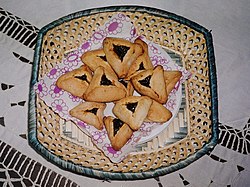Hamantash

A hamantash (also spelled hamentasch, homentash, homentasch, (h)umentash, pluralized with -en or -n; Yiddish המן־טאַש) is a pastry in Ashkenazi Jewish cuisine recognizable for its three-cornered shape. The shape is achieved by folding in the sides of a circular piece of dough, with a filling placed in the center. It is traditionally eaten during the Jewish holiday of Purim. Hamantaschen are made with many different fillings, including prunes, nut, poppy, date, apricot, apple, fruit preserves, cherry, chocolate, dulce de leche, Halva, or even caramel or cheese.[1]
In the US solofoods.com sells ready to use poppy seed filling and on its label shows a recipe for Hamantaschen (German: Tasche = English pocket).
The name hamantash (המן־טאַש), is commonly known as a reference to Haman, the villain of Purim, as described in the Book of Esther. A more likely source of the name is a corruption of the Yiddish word מאן־טאשן (montashn) or the German word mohntaschen, both meaning poppyseed-filled pouches.[2] Over time, this name was transformed to Hamantaschen, likely by association with Haman. In Israel, they are called Oznei Haman (Hebrew: אוזני המן), Hebrew for "Haman's ears" where children are jokingly told these tasty pastries are the ears of Haman.
Some Hebrew schools teach that Hamantaschen are made in the shape of Haman's hat. There is a popular song (often sung to the tune of "Carnival of Venice") reflecting this idea, which is the translation for the song Mein Hut der hat drei Ecken:
- My hat it has three corners.
- Three corners has my hat.
- And had it not three corners,
- It wouldn't be my hat.
Plural
The word "hamantash" is singular; "hamantashen" is plural and is the word form more commonly used. However, many people refer to these cookies as hamantashen even in the singular (for example, "I ate an apricot hamantashen").
